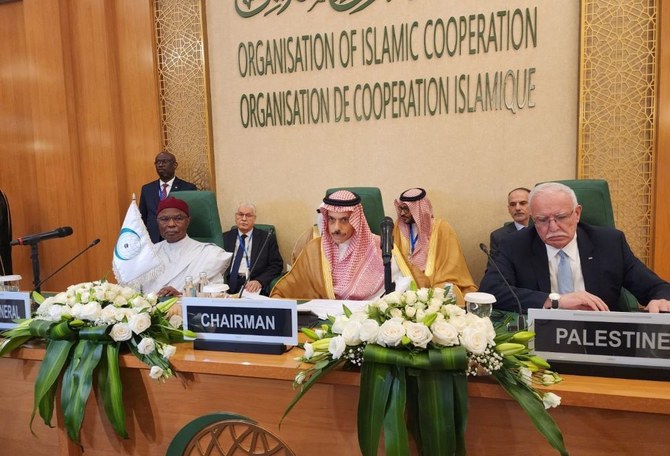RIYADH: Secretary-General of the Organization of Islamic Cooperation Hussein Ibrahim Taha on Wednesday strongly condemned the horrific massacre by the Israeli occupation forces at Al-Ahli Baptist Hospital in Gaza, which killed hundreds of people.
He said Israeli forces should be held fully responsible for the consequences of their terrorism and brutal attacks on the Palestinian people, which he said contradicted all human values and constituted a flagrant violation of international humanitarian law. He also repeated his call to the international community, especially the UN, to urgently intervene to halt war crimes committed by Israel in the Gaza Strip and provide protection for the Palestinian people.
Speaking at the OIC’s emergency ministerial meeting discussing Israeli aggression on Gaza, Taha said the latest incident represented a war crime. He added that it was incompatible with all human values and emphasized that organized state terrorism deserved accountability and punishment.
In his speech at the extraordinary open-ended meeting of the executive committee at the OIC’s headquarters in Jeddah, the secretary-general expressed full solidarity with the Palestinian people. He also pledged steadfast support for their legitimate struggle to achieve the right to self-determination and the establishment of an independent, sovereign state.
Taha went on to note the need for combined efforts to stop such unprecedented Israeli aggression — and to ensure the opening of humanitarian corridors to facilitate the arrival of medicine, food, and essential items to the Gaza Strip.
He stressed that the OIC had warned on more than one occasion of the seriousness of the repercussions of continuing the war against the Palestinian people. The official said these would not have been repeated had there not been a lack of legal and political deterrence from the global community. He added that there had also been a lack of respect for the rule of international law and that Israel’s actions had not been punished.
“The occupation is free from accountability and punishment for its policies based on settlement, forced displacement, ethnic cleansing, murder, organized terrorism, attacks on sanctities, and other practices against the Palestinian people,” he said.
The secretary-general added that the ongoing aggression on the Gaza Strip had violated all rightful principles and values through the killing and wounding of thousands of Palestinians, including children, women, and the elderly. He added that the forced displacement of families — and the indiscriminate destruction of residential, educational, health, and media facilities, including those of the UN Relief and Works Agency for Palestine Refugees, and civilian infrastructure — flagrantly violated international law.
“I hope this meeting will succeed in taking effective measures in order to stop this Israeli aggression, protect the Palestinian people, and provide them with assistance in this ordeal,” said the OIC chief. “We stress that there will be no peace or stability in the region without finding a just and comprehensive solution to the Palestinian issue, ending the Israeli colonial occupation, and embodying the right of the Palestinian people to establish their independent, sovereign state on the 1967 borders with East Jerusalem as its capital, in accordance with the relevant UN resolutions and the Arab Peace Initiative.”
He thanked Saudi Arabia for its invitation to hold the meeting, which endorsed the Kingdom’s support of Islamic nations and most notably the Palestinian cause.
Saudi Arabia’s Foreign Minister Prince Faisal bin Farhan said at the meeting: “We call on the international community to take action to establish safe humanitarian corridors.”
He emphasized that the Kingdom was making every possible effort to communicate with all international and regional parties to stop the ongoing escalation. Prince Faisal also expressed his deep concern about the seriousness of humanitarian conditions in Gaza and the harm being caused to innocent people.
He stressed the Kingdom’s firm support of efforts to achieve a comprehensive and just peace that ensures the Palestinian people attain their legitimate rights.
All 57 member countries of the OIC were invited to attend the meeting.




























